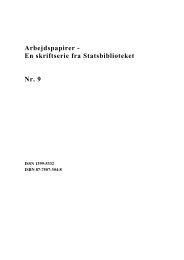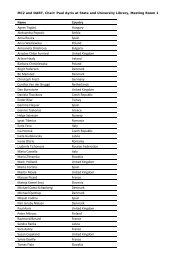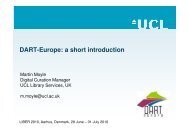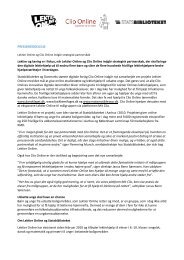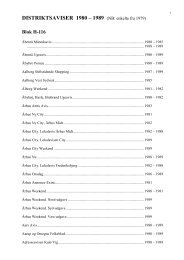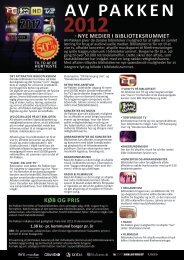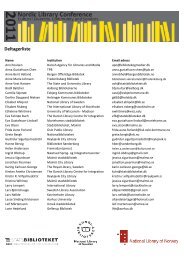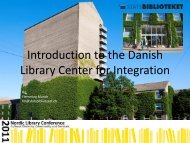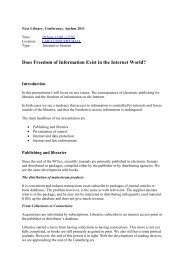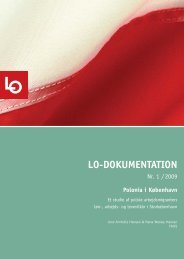LIBER 39TH ANNUAL CONFERENCE - Statsbiblioteket
LIBER 39TH ANNUAL CONFERENCE - Statsbiblioteket
LIBER 39TH ANNUAL CONFERENCE - Statsbiblioteket
Create successful ePaper yourself
Turn your PDF publications into a flip-book with our unique Google optimized e-Paper software.
PaRaLLEL sEssIons 1.1 to 4.1<br />
sEssIon 1.1<br />
mIchaEL JuBB (REsEaRch<br />
InfoRmatIon nEtWoRk, uk):<br />
chaLLEngEs foR LIBRaRIEs In<br />
dIffIcuLt EconomIc tImEs<br />
There has been much discussion over the<br />
past 18 months about the financial difficulties<br />
that academic libraries are facing, and expect<br />
to face in the next few years. A number<br />
of bodies including the American Library<br />
Association, UKSG, and JISC in the UK have<br />
begun to gather evidence on these issues. But<br />
there has been little in the way of attempts<br />
to consolidate and analyse this evidence<br />
systematically to draw an accurate picture of<br />
the actual experience of libraries from across<br />
the sector, or their plans for dealing with the<br />
prospect of cuts in their budgets.<br />
This presentation draws on the work referred<br />
to above, as well as evidence from an<br />
international survey from the Charleston Observatory;<br />
from detailed analyses of library<br />
statistics from the UK, the US and Europe;<br />
and from a series of interviews and focus<br />
groups undertaken by the RIN and the CIBER<br />
team at UCL where the available evidence<br />
was considered in depth by a wide range<br />
of library directors and senior university<br />
managers in the UK, as well as with senior<br />
representatives of the publishing community.<br />
In the UK we are moving from a decade<br />
in which library budgets rose significantly<br />
– though not as fast as university budgets<br />
overall – to one where libraries are being<br />
asked to model cuts of 5-10% a year over<br />
the next three years. Such cuts cannot be<br />
made simply by seeking efficiency savings,<br />
important as those might be. Many directors<br />
are thus looking radically at the nature as<br />
well as the levels of service they can provide<br />
in support of their universities’ teaching,<br />
learning and research missions.<br />
The presentation thus presents evidence on<br />
trends and prospects for the future in such<br />
areas as<br />
- efficiency savings, what has been and<br />
what might be achieved, both by individual<br />
libraries and in partnerships with other<br />
libraries<br />
- the balance between content provision,<br />
staffing and services<br />
- the provision of books and journals, in both<br />
print and digital form, and the costs of that<br />
provision,<br />
- staffing levels, structures, and re-structuring<br />
- service provision including areas such as<br />
opening hours as well as newer areas of<br />
activity such as support for open access initiatives,<br />
and data curation and preservation<br />
- income generation to support library<br />
services.<br />
Many library directors are seeking ways of<br />
dong things differently, and see budget cuts<br />
as an opportunity to rethink what the library<br />
does and what it means. But there are as yet<br />
few concrete proposals that will transform<br />
services or yield large-scale savings. The<br />
presentation will thus also review, in the light<br />
of the current financial climate, the various<br />
steps that are being taken to develop a closer<br />
understanding of the relationships between<br />
expenditure on library activities and services<br />
on the one hand, and learning and research<br />
outcomes on the other.<br />
michael Jubb is Director of the Research<br />
Information Network (RIN). He has held<br />
a variety of posts, as an academic; an<br />
archivist; a civil servant; Deputy Secretary<br />
of the British Academy; and as Deputy<br />
Chief Executive of the Arts and Humanities<br />
Research Board (AHRB), which he led<br />
through its transition to full Research Council<br />
status. In 2005 he took up the Directorship of<br />
the RIN, which has been set up to investigate<br />
how to improve the information resources<br />
and services available to and used by UK<br />
researchers across all disciplines, in science,<br />
technology and medicine as well as the arts<br />
and humanities.<br />
29 JunE 2010<br />
29



